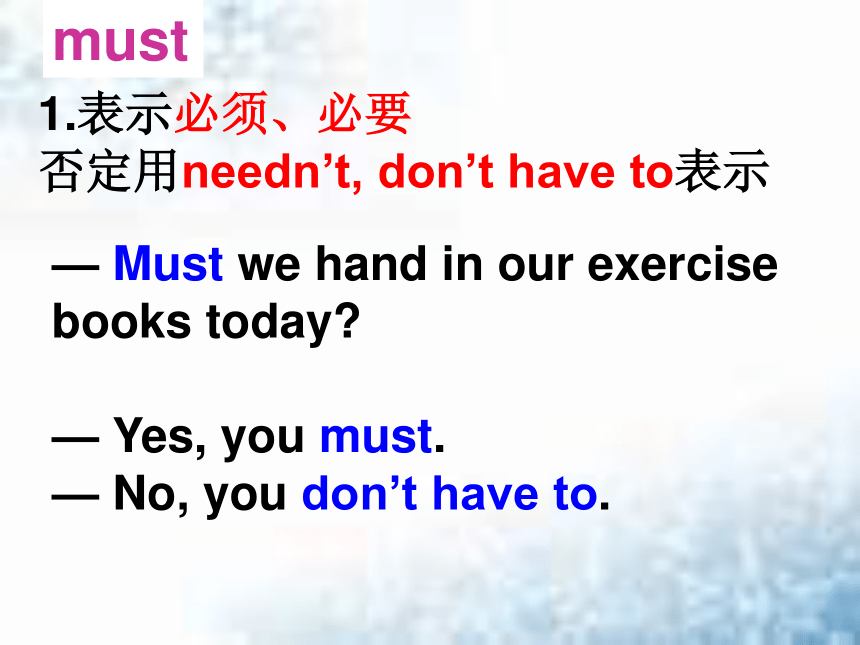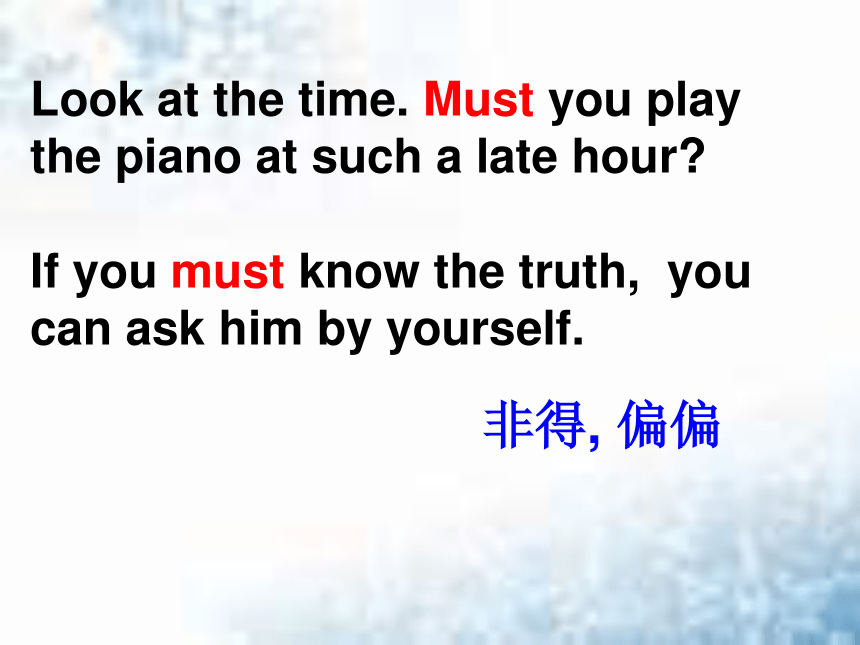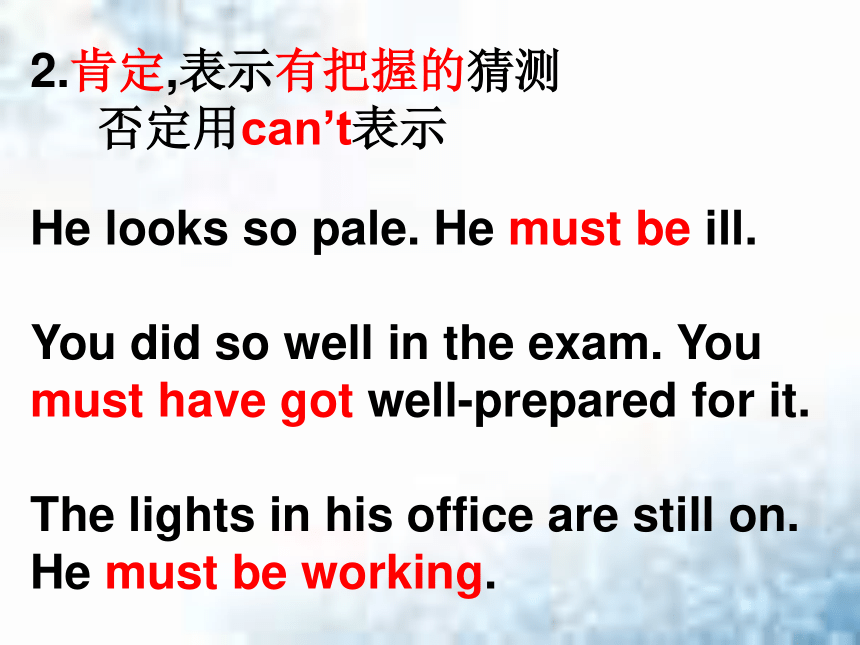modal verbs 情态动词(浙江省湖州市长兴县)
文档属性
| 名称 | modal verbs 情态动词(浙江省湖州市长兴县) |

|
|
| 格式 | rar | ||
| 文件大小 | 131.7KB | ||
| 资源类型 | 教案 | ||
| 版本资源 | 通用版 | ||
| 科目 | 英语 | ||
| 更新时间 | 2007-10-25 00:00:00 | ||
图片预览









文档简介
课件23张PPT。Modal Verbs
情态动词情态动词是一种本身有一定的词义,表示说话人的情绪,态度或语气的动词,但不能单独作谓语, 只能和其他动词原形构成谓语。 must 表示必须、必要
否定用needn’t, don’t have to表示 — Must we hand in our exercise books today?
— Yes, you must.
— No, you don’t have to.Look at the time. Must you play the piano at such a late hour?
If you must know the truth, you can ask him by yourself.非得, 偏偏2.肯定,表示有把握的猜测
否定用can’t表示He looks so pale. He must be ill.
You did so well in the exam. You must have got well-prepared for it.
The lights in his office are still on. He must be working.can/could表示能够,可以,请求, 允许Can you finish this work tonight?
Man cannot live without air.
— Can I go now?
— Yes, you can.
Could I come to see you tomorrow? 2. 表示猜测。
(主要用在否定句或疑问句中) Can this be true?
This cannot be done by him.
He cannot have been to Greece.
The World Wide Web is sometimes jokingly called the World Wide Wait because it ______be very slow.
A.should B.must
C.will D.can 表示特性Dmay(might)
1. 表示许可。 May I come in?
Might I speak to him now?
You may drive the car. 3. 用于祈使句中表示祝愿。may +sb.+v.May you succeed! 3. 表示推测、可能
He may be very busy. He may not have finished the work.You should have turned to him for help. He might have helped you,even though he was very busyHe might be doing his home work now.4. may/might as well 不妨,倒不如
It’s useless trying to arguing with Shylock. You might as well go stand upon the beach and argue with the sea.should 1. 表示义务/ ought to You should do what your teachers tell you to.This is something I should have asked you.They shouldn’t have concealed(隐瞒) it.本应该做到而实际上没有做到,
并包含一种埋怨、责备的口气 2. 表示推测, 暗示很大的可能性The photos should be ready at noon. You can come to fetch them then.I should recognise her among a thousand.3. 用于虚拟(1)if引导的条件从句,相当于“万一” 。
If you should change your mind, please let us know.
Should you change your mind,…
(3)It’s natural, strange, important, necessary that…sb (should) doIt's natural that she should do so. (2)用于某些宾语从句中
insist
order, command
suggest, advise, recommend, propose
require, request, demand, desire, urge4. Why /How + should “竟会,竟然”
表示说话人对某事不能理解,感到意外、惊异等意思。
Why should you be so late today?
I don't know why you should think that I did it. shall 1. shall用于第一, 三人称,表示说话人征求对方的意见或向对方请示 。 Shall we begin our lesson?
When shall he be able to leave the hospital? 2. Shall用于第二、三人称,表示义务多用于正式法律文字
The law of Venice says that if
anyone tries to kill or murder and citizen of Venice, everything that he owns shall be taken away from him.3. Shall用于第二、三人称,表示许诺
You shall have my answer tomorrow.He shall have the book when I finish reading. 表示请求、建议等,would比will委婉客气。
2. 表示意志、愿望和决心。 will/ would Would you pass me the book? I will never do that again.-Don’t forget to attend my party?
-No, I won’t.3. Would可表示过去反复发生的动作或某种倾向。4. 表料想或猜想。I believe someday, wars will come to an end.Boys will be boys.I would often go fishing when I lived in the countryside.I need a bike to go to school.
Do you need a dictionary?
needn’t have done
表示过去做了没必要做的事情。
It was just a joke. You needn't have taken it seriously. need He doesn't dare to tell the teacher what happened that day. dare The little girl dare not speak in public. Dare you catch the little cat? Do you dare to walk in the dark?
情态动词情态动词是一种本身有一定的词义,表示说话人的情绪,态度或语气的动词,但不能单独作谓语, 只能和其他动词原形构成谓语。 must 表示必须、必要
否定用needn’t, don’t have to表示 — Must we hand in our exercise books today?
— Yes, you must.
— No, you don’t have to.Look at the time. Must you play the piano at such a late hour?
If you must know the truth, you can ask him by yourself.非得, 偏偏2.肯定,表示有把握的猜测
否定用can’t表示He looks so pale. He must be ill.
You did so well in the exam. You must have got well-prepared for it.
The lights in his office are still on. He must be working.can/could表示能够,可以,请求, 允许Can you finish this work tonight?
Man cannot live without air.
— Can I go now?
— Yes, you can.
Could I come to see you tomorrow? 2. 表示猜测。
(主要用在否定句或疑问句中) Can this be true?
This cannot be done by him.
He cannot have been to Greece.
The World Wide Web is sometimes jokingly called the World Wide Wait because it ______be very slow.
A.should B.must
C.will D.can 表示特性Dmay(might)
1. 表示许可。 May I come in?
Might I speak to him now?
You may drive the car. 3. 用于祈使句中表示祝愿。may +sb.+v.May you succeed! 3. 表示推测、可能
He may be very busy. He may not have finished the work.You should have turned to him for help. He might have helped you,even though he was very busyHe might be doing his home work now.4. may/might as well 不妨,倒不如
It’s useless trying to arguing with Shylock. You might as well go stand upon the beach and argue with the sea.should 1. 表示义务/ ought to You should do what your teachers tell you to.This is something I should have asked you.They shouldn’t have concealed(隐瞒) it.本应该做到而实际上没有做到,
并包含一种埋怨、责备的口气 2. 表示推测, 暗示很大的可能性The photos should be ready at noon. You can come to fetch them then.I should recognise her among a thousand.3. 用于虚拟(1)if引导的条件从句,相当于“万一” 。
If you should change your mind, please let us know.
Should you change your mind,…
(3)It’s natural, strange, important, necessary that…sb (should) doIt's natural that she should do so. (2)用于某些宾语从句中
insist
order, command
suggest, advise, recommend, propose
require, request, demand, desire, urge4. Why /How + should “竟会,竟然”
表示说话人对某事不能理解,感到意外、惊异等意思。
Why should you be so late today?
I don't know why you should think that I did it. shall 1. shall用于第一, 三人称,表示说话人征求对方的意见或向对方请示 。 Shall we begin our lesson?
When shall he be able to leave the hospital? 2. Shall用于第二、三人称,表示义务多用于正式法律文字
The law of Venice says that if
anyone tries to kill or murder and citizen of Venice, everything that he owns shall be taken away from him.3. Shall用于第二、三人称,表示许诺
You shall have my answer tomorrow.He shall have the book when I finish reading. 表示请求、建议等,would比will委婉客气。
2. 表示意志、愿望和决心。 will/ would Would you pass me the book? I will never do that again.-Don’t forget to attend my party?
-No, I won’t.3. Would可表示过去反复发生的动作或某种倾向。4. 表料想或猜想。I believe someday, wars will come to an end.Boys will be boys.I would often go fishing when I lived in the countryside.I need a bike to go to school.
Do you need a dictionary?
needn’t have done
表示过去做了没必要做的事情。
It was just a joke. You needn't have taken it seriously. need He doesn't dare to tell the teacher what happened that day. dare The little girl dare not speak in public. Dare you catch the little cat? Do you dare to walk in the dark?
